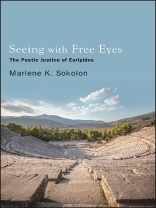Examines the ideas of justice in Euripidean tragedy, which reveals the human experience of justice to be paradoxical, and reminds us of the need for humility in our unceasing quest for a just world.
Responding to Plato’s challenge to defend the political thought of poetic sources, Marlene K. Sokolon explores Euripides’s understanding of justice in nine of his surviving tragedies. Drawing on Greek mythological stories, Euripides examines several competing ideas of justice, from the ancient ethic of helping friends and harming enemies to justice as merit and relativist views of might makes right. Reflecting Dionysus, the paradoxical god of Greek theater, Euripides reveals the human experience of understanding justice to be limited, multifaceted, and contradictory. His approach underscores the value of understanding justice not only as a rational idea or theory, but also as an integral part of the continuous and unfinished dialogue of political community. As the first book devoted to Euripidean justice, Seeing with Free Eyes adds to the growing interest in how citizens in democracies use storytelling genres to think about important political questions, such as ‘What is justice?’
Mục lục
Acknowledgments
Introduction
Part I: Justice in the City
1. The Medea: What Justice Conceals
2. The Bacchae: Justice, Dialectics, and Dismemberment
3. The Phoenician Women: Justice is Multicolored
Part II: Justice in Sacred Spaces
4. The Ion: Justice, In and Out of Bounds
5. The Children of Heracles: And Justice for Others
6. The Suppliant Women: Justice among Cities
Part III: Justice in the Wilderness
7. The Hecuba: Justice as Autonomy
8. The Alcestis: Justice as Generosity, or Too Much of a Good Thing
9. The Electra: The Justice of Good and Bad Judgment
Conclusion
Notes
Bibliography
Index
Giới thiệu về tác giả
Marlene K. Sokolon is Associate Professor of Political Science at Concordia University, Canada. Her books include Political Emotions: Aristotle and the Symphony of Reason and Emotion.












